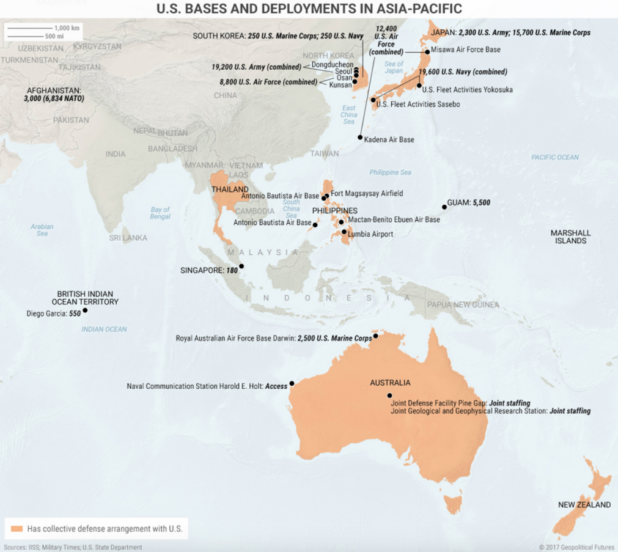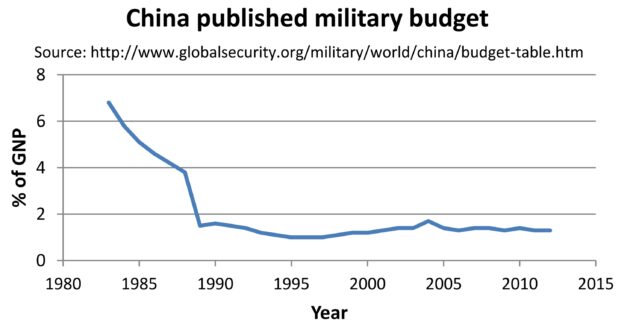In response to my article yesterday about China’s plan for the world, I got several complaints about the claim I made that China has not built up its military in the way that John Mearsheimer predicted that it would. I stand by this statement as being fundamentally true, though as is often noted by both critics and fans of my writing, I am prone to gross simplification for the sake of promoting a clear understanding of issues among people who are not sitting around reading think tank papers and statistics.
Frankly, a lot of these complaints appear like nagging. It seems to me that if people wanted detailed statistical breakdowns, detailed historical analysis, or think tank autism, they would go somewhere else to find these things. I’m using broad strokes, and I think everything I say is fundamentally true or I wouldn’t say it, and these simplifications are just that. The whole idea is that I spend my time going through this sort of material so that the reader does not have to.
Consider this response a general response to nagging, nit-picky complaints about “oversimplification.”
It should first be noted that the way these numbers are tabulated by Western institutions is debatable (to say the least) and the way that Western think tanks classify Chinese military spending doesn’t line up with the way China calculates these numbers. China does not file an annual budget report broken down into categories like the US does, making any estimate by a Western think tank on “defense spending” simply a guess which may or may not be backed up by good information.
That said, China has definitely increased military spending, but this increase has in no way aligned with a plan to threaten anyone in the region, let alone confront the United States. It is all defensive (a lot of short to medium range anti-air, anti-ship, etc.).
The US has completely surrounded China with military bases.
It would be absurd not to be prepared for some kind of conflict in the region, given the ridiculous hostility and encroachment of the United States.
Moreover, China’s economy has done very well over the last ten years, despite some underlying problems that Xi inherited from his predecessors (most notably the housing crisis). So, on some level, when every sector is expanding, you would simply expect the military sector to expand. It’s only logical that they would be focused on developing military technology. As I assume everyone is aware, military technologies often have civilian and consumer application.
Officially, military and internal security spending (announced as the same thing by the Chinese government) has increased at an average of around 7% over the last decade, which more or less overlaps with their rate of economic growth. Moreover, this is after a steep drop in military spending to GDP ratio in the 1980s.
According to the World Bank (one of the main groups that keeps track of these things), China’s military budget as a percentage of its GDP has remained static since the 2000s, at around 1.8%.
Simply: there is a very big difference between expanding your military on pace with the larger economy and a “military buildup.”
What China has not done has moved to expand into a “regional military power” or a “hegemon” in the way that Mearsheimer predicted. China has not devoted 40% of its total government spending budget to the military, or even anything close to that, nor are they moving towards something like that.
Perhaps most notably, China has not started building military bases around the world.
China has one overseas military base, while the US has “approximately 750” of these bases.
Okay?
To Summarize:
Expanding the military budget at the same rate as expanding the GDP could be equated to “not really expanding the military budget.” When a child is growing, his hands and feet are growing proportionally with the rest of his body. This is much different from an adult growing a fat gut.
Furthermore, it is obviously just basic common sense that when the US is building up its military all around you, and constantly threatening you with war, you are going to at least make it clear that you won’t go down without a fight. Certainly, Mearsheimer’s predictions have been completely wrong, objectively.
My predictions that China would focus primarily on trade networks, foreign investment, and developing their own domestic industry, especially tech industries, with specific focus on consumer electronics, have proved exactly correct.
I’m not claiming to never make mistakes. I write a lot and virtually all of it is directly from memory. That’s the process. I read a lot and then I write a lot. So there is room for small mistakes. I accept that. This is the nature of the process and a result of not having an editor and producing such a massive output.
However, this is very rare, and I do not accept this nitpicky claim that “oversimplification” is equivalent to “being wrong.”
I will say that it would have been better if I had included the sentence “China’s military budget has tracked with their GDP.”
The funny part is: I’m pretty sure John Mearsheimer himself would admit that I am right here. He would still say that he expects China to “transfer their economic power into military power” in the future, but he would agree that this has not happened yet.
It’s unfortunate that I’ve been so absurdly slandered by the media, because virtually no one wants to take the flak for being associated with me, even if they follow my material and are aware that my reputation in the media is a result of the malicious false interpretation of satire and other edgy humor. If this wasn’t the case, it would be interesting to have a debate between me and Dr. Mearsheimer on the future of China. He’s someone I respect a lot and actually agree with on many or most things, but I feel he’s allowed abstract reasoning to color his view of obvious physical realities when it comes to the trajectory of China.
Fortunately, the Chinese themselves don’t care that I made edgy jokes and was painted as evil by the media, and don’t really even understand the logic behind why anyone would care what the media has said about me. Because of this, I’m widely read by English-speaking Chinese, and a Chinese university would happily arrange a formal debate between myself and Dr. Mearsheimer. He’s more knowledgable than me, being twice my age and presumably having a higher IQ, so he would certainly have the advantage in the debate; I’m nonetheless very confident I would prevail. But of course, his attendance of such an event would be reported by the Western media and used to attack him (even though he is there to debate me and promote a view he shares with the US State Department), so I fully understand why he would refuse such an offer, and do not believe he would refuse the offer if it weren’t for my strange status as both a very popular and influential commentator and someone whom public acknowledgement of is a career-destroyer.




